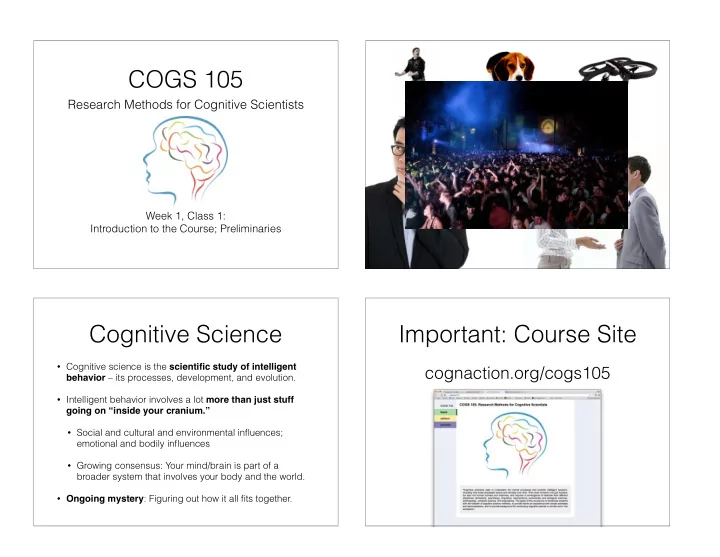

COGS 105 Research Methods for Cognitive Scientists Week 1, Class 1: Introduction to the Course; Preliminaries Cognitive Science Important: Course Site • Cognitive science is the scientific study of intelligent cognaction.org/cogs105 behavior – its processes, development, and evolution. • Intelligent behavior involves a lot more than just stuff going on “inside your cranium.” • Social and cultural and environmental influences; emotional and bodily influences • Growing consensus: Your mind/brain is part of a broader system that involves your body and the world. • Ongoing mystery : Figuring out how it all fits together.
Who Are You People? Outline of Course Learning Outcomes Readings
Grading Lecture Slides exams • Yes, a simplified version of the 20% x 3 = 60% lecture slides will be provided labs 30% each week. final paper 10% • Study guides will be supplied 1 week prior to exams. Up to bonus 5%! No Section This Week Let’s Start • Note, there will be no sections this week ; we start next week. • Monday was a holiday; no material to discuss.
the big questions frame the scientific value of our methods What Thinks? method 1 philosophy method 2 method 3 computer science method 4 psychology method 5 anthropology method 6 … Complex Dog Cognition? Big Questions • Big concepts and questions: What is thinking ? What is • Chaser the border collie can respond uniquely to intelligence ? What is consciousness ? over 1,000 English words. • If we assume something does think, how can we find out what kind of thinking it does? • All kinds : Perception, action, problem solving, language, memory, learning, etc. • Cognitive science is hopeless without rigorous methodologies , especially empirical and computational methodology.
Multi-Methodological… Philosophy Approach • Many important questions about thinking cannot be addressed experimentally, so use logic and reason to • Philosophy • Linguist address them. • Psychology • Mathematician • Is it possible for non-biological systems (e.g., computers) to have thoughts? • Anthropology • Computational scientist • What is the connection between the mental and physical? • Neuroscience • Artificial Intelligence • Is there free will? • Biologist • Consciousness??? Dr. Carolyn Jennings, UCM Philosopher and Cognitive Scientist Psychological Approach Anthropological Approach • Thinking is expressed through behavior, so experiment • Thinking occurs naturally in social and cultural with behavior to infer what is going on in thinking. contexts, so observe behavior in situ to infer thinking mechanisms. • Reflexes? Tapping? Dr. Eric Walle UC Merced Psychologist • Compare across cultures, social situations, languages • Simple and choice responding • Categorizing • Compare across evolutionary history, in terms of biology as well as culture and society • Talking, reading • Planning, readoning, gaming, etc. Dr. Holley Moyes • Music? Art? Dating? Emotion? UCM Anthropologist
Neuroscience Approach Biological Approach • Thinking occurs in all sufficiently complex • Thinking in biological organisms requires neurons, biological organisms, so use simpler organisms as so observe and experiment with the brain to infer models of thinking mechanisms. thought mechanisms. Dr. Ramesh Balasubramaniam • Molecules and DNA? Ion channels? Model organisms can be controlled more easily. • How simple can we get? • Spiking patterns across the brain? • Dr. Suzanne Sindi some dude Dr. David Ardell What aspects are general across organisms? • • Brain areas? Networks? Ethical issues. • interdisciplinary project! Butovens Médé, Ph.D. student Linguistic Approach Mathematical Approach • Theories of thinking are most powerful and testable • Thoughts may be symbolic in nature, and language when formalized, so use mathematical expressions is the quintessential symbolic system, so study from which properties can be derived, proven, language to infer thought mechanisms. tested… • Sounds? Words? Dr. Roummel Marcia Dr. Suzanne Sindi • Grammar? Meaning? • Discourse? Applied Mathematics UC Merced Dr. Stephanie Shih UC Merced Cognitive Scientist and Linguist
Computational Approach Artificial Intelligence • Thinking is not tied to biological substrates, so let’s • Theories of thinking can be setup as computer build machines that implement thinking programs, so run those programs to hone, explore, mechanisms. and test theories! • Can be quite different from cognitive models. • Models might be based on ideas from the brain or other areas (such as logic or rule systems; see Reading 2 ) • How similar are artificial systems to the way humans think? • Models are typically very complex Dr. Anne Warlaumont Dr. Paul Maglio UC Merced Cognitive Science, Hardcore Neural Computationalist UC Merced Cognitive Scientist talking to IBM about Watson Does Watson Think? Multi-Methodological… • Philosophy • Linguist • Is Watson intelligent? • Psychology • Mathematician • For a primer on these • Anthropology • Computational scientist issues, which are now a half-century old, check • Neuroscience • Artificial Intelligence out the required Reading 1 + online activity. • Biologist
See you Thursday! • Remember, no sections held this week ; let’s start next week! • Thursday : Following along our line of discussion about the history and goals of cognitive science.
Recommend
More recommend